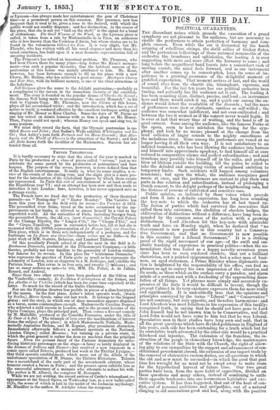FRE.NCH. TIIEA THICALS.
It is hardly necessary to state that the close of the year is marked in Paris by the production of a class of pieces called " revues," just as we celebrate the same period by the production of pantomimes and bur- lesques. The purpose of the revue, however, is more defined than that of the English entertainment. It really is, what its name implies, a re- view of the events of the closing year, and the slight plot is a mere pre- text for the introduction of the symbolical figures by which those events are represented. In Paris this sort of entertainment is at least as old as the Republican year VI; and an attempt has been now and then made to introduce it into London: here, however, it has never appeared save as a strange exotic.
The French have no fixed day for the production of these theatrical annuals—no " Boxing-day " or Easter Monday." The Varietes has been this year first in the field with its revue—Les Varietes de 1852. The personified river Seine, vexed at the noise occasioned by the im- provements on her banks, is allowed to amuse herself by a visit to the superficial world. All the curiosities of Paris, including Georges Sand, the personified Bourse, the old sou, (now &Monett:960 the Crystal Palace of the Champs Elysees, the " Lingot d'Or," the "Cirque d'Ete," and the "Cirque Napoleon,' pass in succession before her, till at last she is recreated with the 2999th representation of La Femme (sic) aux Camelia& This piece, which is in three acts independently of a prologue, and the burlesque on La _Dame aux Cante'lias—these revues are no trifle—is the joint work of MM. Guenee, Delacour, and Lambert Thiboust.
Of this peculiarly French school of play the next in the field is Le Bonhomme Dimanche, 'produced at the Delassements Comiquee,—a little theatre, probably not very familiar to the generality of London visitors, but famous for its revues. In this piece the " bonhomme Dimanche " who represents the gayeties of Paris quite as much as he represents the solemnity of London acts as chaperon to a M. Zodiaque, and exhibits the Parisian lions. This revue is in four acts, and twenty (!) tableaux; and has as many authors as acts—to wit, MM. Ch. Potier, A. de Renard, and Audeval.
Since these two other revues have been produced at the Odeon and the Vaudeville,—namely, Is Feuilleton 'Aristophane at the former, and Les Abeilles et lea Violates (which has been for some time expected) at the latter. So much for the record of the Gallic Christmas.
Nor are the Parisian theatres less prolific in pieces of a classless typical of the season. In the first place, Auber's latest operatic work, (words by Scribe,) Marco Spada, came out last week. It belongs to the brigand genus ; and the story, in which one of these marauders appears disguised as a baron, seems commonplace enough. Mademoiselle Caroline Duprez, who achieved a mild success in London, and is the present heroine of the Opera Comique, plays the principal part. Then comes a five-act comedy by M. Mallefille, produced at the Comedie Francaise under the title of Is Cceur et le Dot. The triumph of love over the machinations of interest forms the subject of the piece ; in which Mademoiselle Nathalie' Made- moiselle Augustine Brohan' and M. Regnier, play prominent characters. Immediately afterwards follows a military spectacle at the National, (Aneien Cirque,) called Massina ; but turning on a private story, in which the great general is rather the dens ex machina than the principal figure. Even the present fancy of the Parisian dramatists for intro- ducing histrionic personages on the stage—a fancy so lately displayed in the dramas of Sullivan and Taconet—has received a new exponent in a comic opera called Tabarin, produced last week at the Theatre Lycigne,— that third operatic establishment, which arose out of the debris of the unfortunate speculation of M. Dumas, the Theatre Historique. Tabarin was a mountebank of the early part of the seventeenth century, whose humour created a furore in Paris ; and the present opera exhibits him as the successful adversary of a marquis who attempts to seduce his wife. The author is M. Alborm, the composer M. Bousquet. While we are yet writing, the record arrives of Cerito's triumphant re- appearance at the Grand Opera, on Wednesday last, in a new ballet called &fa, the scene of which is laid in the midst of the Icelandic mythology. K. Ma zillier is the author, M. Adolphe Adam the composer,
































 Previous page
Previous page